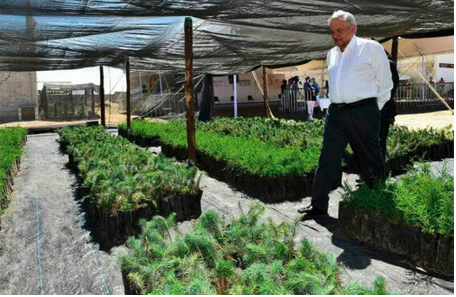The funds would support two employment programs in three countries
Mexico has asked the United States to provide US $108.4 million a month to fund the implementation of two employment programs in Central America.
As part of efforts to attend to the structural causes of migration in the region, the United States agreed last week to collaborate on the expansion of the Sembrando Vida (Sowing Life) tree-planting employment program and the Youths Building the Future apprenticeship scheme.
The programs – signature initiatives of the federal government, albeit ones that have been allegedly tainted by corruption – will be rolled out in Guatemala, Honduras and El Salvador.
Mexico wants the United States to provide $86.4 million per month for Sembrando Vida and $22.03 million per month for Youths Building the Future, according to the newspaper Milenio, which obtained a document submitted to U.S. officials at high-level bilateral talks in Washington D.C. last Thursday.
Mexico proposed that the funding be provided via the United States Agency for International Development, commonly known as USAID. Mexico will design the programs and provide technical support to them, according to the document, entitled A Common Vision for the Region.
The federal government proposed the participation of 240,000 Guatemalans, Hondurans and Salvadorans in Sembrando Vida and 90,000 people aged 18 to 29 in Youths Building the Future. Participants in both would receive $360 per month.
Sembrando Vida beneficiaries would also have the opportunity to study at agricultural schools, according to the document. Mexico acknowledged that one barrier to the program could be participants’ inability to find land on which to plant timber-yielding and fruit trees. However, plans to facilitate access to land will be implemented, it said.
The apprenticeship scheme will provide training and financial support to young Central Americans for a period of two years. Some 5,000 workplaces are slated to participate in the program, which would likely commence sometime next year.
President López Obrador said earlier this year that the United States should issue temporary visas to Central Americans who work in Sembrando Vida for three years. But the United States has shown little interest in the proposal.
Mexico and the U.S. did, however, sign a memorandum of understanding in June to establish a strategic partnership to address the lack of economic opportunities in northern Central America.
After last week’s High Level Economic Dialogue in Washington, the White House said the United States and Mexico “will identify complementary and cooperative opportunities to improve livelihoods through the creation of jobs and opportunities in the short, medium, and long term in El Salvador, Honduras, Guatemala and southern Mexico.”
The increased cooperation between the two countries comes as record numbers of migrants stream into Mexico en route to the United States, while more than 212,000 migrants were detained in the U.S. in July after illegally crossing the border. The figure was the highest monthly total in more than 20 years.
With reports from Milenio
Cuba’s president will be the guest of honor at Independence celebrations
López Obrador continues to show his affection for the nation
The president of Cuba will be the guest of honor and give a speech at Thursday’s Independence Day celebrations, becoming the first foreign leader to address the event.
President López Obrador confirmed Tuesday that Miguel Díaz-Canel would speak at a ceremony prior to a military parade in downtown Mexico City to celebrate the 211th anniversary of the beginning of the fight for independence in Mexico.
Speaking at his regular news conference, López Obrador defended the Cuban leader’s participation in the Fiestas Patrias, emphasizing that Mexico has friendly relations with all the world’s nations.
However, the president has a special affection for Cuba, declaring in July that the Caribbean island nation is an “example of resistance” and the whole country should be declared a World Heritage site.
He also called for an end to the United States trade embargo as a way to end large protests in Cuba earlier this year, and sent three ships carrying diesel, medical supplies and food to the country in what experts described as Mexico’s biggest aid run to the country in three decades.
At his press conference on Tuesday, López Obrador also responded to criticism from former president Felipe Calderón, who said that it was unacceptable for a dictator to take a central role in Mexico’s Independence Day celebrations.
“ … It’s good that he doesn’t like it!” the president said before accusing his longtime foe of hypocrisy because he met with former Cuban president Raúl Castro while he was in office.
López Obrador also said Tuesday that United States President Joe Biden wouldn’t come to Mexico this month to join celebrations marking the 200th anniversary of the end of the 11-year War of Independence against the Spanish.
“President Biden was invited for the 27th [of September]. He can’t be here, but the head of the United States Department of State will be here,” he said, referring to Secretary of State Antony Blinken.



